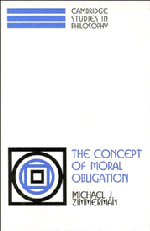Book contents
- Frontmatter
- Contents
- Preface
- Acknowledgments
- 1 Groundwork: Some distinctions
- 2 Moral obligation: An analysis
- 3 The dynamics of obligation
- 4 Conditional obligation
- 5 Prima facie obligation
- 6 Actualism and possibilism
- 7 Dilemmas
- 8 Supererogation
- 9 Cooperation
- Postscript
- Appendix: List of propositions
- List of works cited
- Index of names
- Index of subjects
2 - Moral obligation: An analysis
Published online by Cambridge University Press: 18 February 2010
- Frontmatter
- Contents
- Preface
- Acknowledgments
- 1 Groundwork: Some distinctions
- 2 Moral obligation: An analysis
- 3 The dynamics of obligation
- 4 Conditional obligation
- 5 Prima facie obligation
- 6 Actualism and possibilism
- 7 Dilemmas
- 8 Supererogation
- 9 Cooperation
- Postscript
- Appendix: List of propositions
- List of works cited
- Index of names
- Index of subjects
Summary
VALUE MAXIMIZATION
Two problems
At his doctor's request, Sam sticks out his tongue and says: “Aah.” In order to vote, Vincent drives his car to the polling station. Puzzles lurk within these mundane examples.
The claim that one ought to do the best one can (where, as explained in the last chapter, “ought” expresses what I have called “mere obligation,” and “best” refers to deontic value) is perhaps most naturally, indeed standardly, understood to mean the following: of all those actions which one can perform (one's “alternatives,” as it is often put), one ought to perform that action (if any) whose deontic value would be greater, if it were performed, than the deontic value of any other, if it were performed. But there are at least two problems with so understanding it.
The first problem was exposed by Hector-Neri Castañeda. Suppose that it is deontically best that Sam comply with his doctor's request. Suppose, that is, that
(2.1) Sam ought to stick out his tongue and say: “Aah.”
Then presumably
(2.2) Sam ought to stick out his tongue, and Sam ought to say: “Aah.”
But, on the current understanding of what it is to be obligated to do the best one can, the first part of (2.2) implies that
(2.3) the deontic value of Sam's sticking out his tongue would be greater, if it were performed, than the deontic value of his saying “Aah,” if it were performed;
while the second part of (2.2) implies that
(2.4) the deontic value of Sam's saying “Aah” would be greater, if it were performed, than the deontic value of his sticking out his tongue, if it were performed.
- Type
- Chapter
- Information
- The Concept of Moral Obligation , pp. 21 - 78Publisher: Cambridge University PressPrint publication year: 1996



